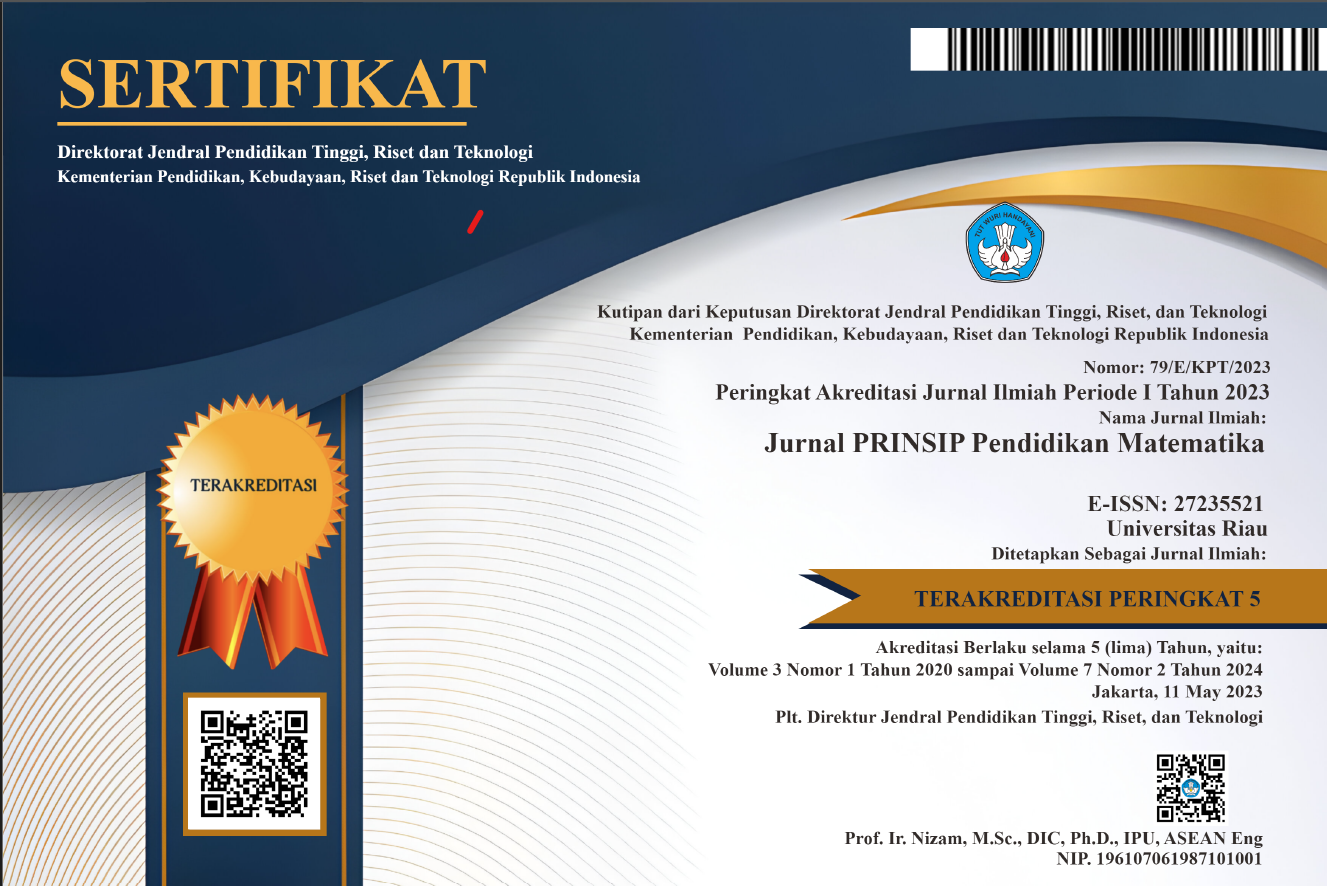THE EFFECT OF IMPLEMENTING A DIRECT LEARNING MODEL WITH GEOGEBRA SOFTWARE TOWARD STUDENTS’ MATHEMATIC CONCEPT COMPREHENSION ABILITY DERIVED FROM THEIR SELF-EFFICACY
Abstract
This research aimed to know the effect of implementing a direct learning model with Geogebra on students' mathematic concept comprehension ability derived from their self-efficacy. It was an experimental research with a factorial experimental design. All the eleventh-grade students of pharmacy major at vocational High school of Ikasari Pekanbaru in the academic Year of 2019-2020 were the population of this research. The samples of this research were the eleventh-grade students of Pharmacy 6 as the Experimental group and the students of Pharmacy 2 as the Control group. The Cluster Random Sampling technique was used in this research. The data collection techniques were a test, questionnaire, observation, and documentation. The data collection instruments were the teacher and student observation sheets, mathematic concept comprehension ability pretest and posttest: self-efficacy questionnaire, and documentation. The technique of analyzing the data was two-way ANOVA. Based on the data analysis, it could be concluded that 1) there was a difference in mathematic concept comprehension ability between students taught by using Direct learning model with Geogebra software and those who were taught by using Conventional learning, 2) there was a difference in mathematic concept comprehension ability among students having high, medium, and low self-efficacy, 3) there was no interaction between learning model and self-efficacy toward student mathematic concept comprehension ability. So it could be concluded that implementing the Direct learning model with Geogebra software was affected by students' mathematic concept comprehension ability derived from their self-efficacy.
Downloads
References
Amir, Z., & Risnawati. (2015). Psikologi pembelajaran matematika. Aswaja Pressindo
Destiniar, Jumroh, & Maya, D. (2019). Kemampuan pemahaman konsep matematis ditinjau dari self efficacy siswa dan model pembelajaran Think Pair Share (TPS) di SMP Negeri 20 Palembang. JPPM: Jurnal Penelitian dan Pembelajaran Matematika, 12(1), 115-128u
Dinni, H. (2018). HOTS (High Order Thinking Skills) dan kaitannya dengan kemampuan literasi matematika. PRISMA: Prosiding Seminar Nasional Matematika, 1(1), 170-176
Hendriana, H., Rohaeti, E.E., & Sumarmo, U. (2017). Hard skills dan soft skills matematik siswa. Refika Aditama
Hidayat, R., & Nurrohmah. (2016). Analisis peningkatan kemampuan pemahaman konsep matematis siswa MTs lewat penerapan model pembelajaran Problem-Based Learning berbantuan software Geogebra berdasarkan Kemampuan Awal Matematika. JPPM:Jurnal Penelitian dan Pembelajaran Matematika, 9(1), 12-19. http://dx.doi.org/10.30870/jppm.v9i1.975
Hohenwarter, M., dan Fuchs, K. (2004). Combination of dynamic Geometry, Algebra, and Calculus in the software system Geogebra,. http://pdfs.semanticscholar.org/137b/7e90b60215b97afa4fd3fa0edada3ec167b8.pdf
Jannah, M., Supriadi, N., & Fraulen I. (2019). Efektivitas model pembelajaran Visualization Auditory Kinesthetic (VAK) terhadap pemahaman konsep matematis berdasarkan klasifikasi self efficacy. AKSIOMA (Jurnal Program Studi Pendidikan Matematika), 8(1), 215-224. https://doi.org/10.24127/ajpm.v8i1.1892
Kemendikbud. (2014). Salinan Lampiran Permendikbud No. 60 Tahun 2014 Tentang Kurikulum 2013 Sekolah Menengah Kejuruan/Madrasah Aliyah Kejuruan. Kemendikbud
Keristiana, E., Siregar, S., & Lubis, A. (2017). Pengaruh Pembelajaran Langsung terhadap pemahaman konsep matriks dan Sikap Ilmiah mahasiswa Pendidikan Teknik Bangunan. Jurnal Education Building, 3(2), 17-26. https://doi.org/10.24114/eb.v3i2.8253
Leo, Y., Hartoyo, A., & Yani, A. (2014). Pengaruh penggunaan software Geogebra terhadap pemahaman konsep siswa pada materi Lingkaran di kelas XI SMA. Jurnal Pendidikan dan Pembelajaran Khatulistiwa, 3(5), 1-10
Mahmun, N. (2014). Media dan sumber belajar: Berbasis terknologi informasi dan komunikasi. Aswaja Pressindo
Masnia, F., & Amir, Z. (2019). Pengaruh penerapan model Scaffolding terhadap kemampuan pemahaman konsep matematis berdasarkan self efficacy siswa SMP. Journal for Research in Mathematics Learning, 2(3), 249-256. http://dx.doi.org/10.24014/juring.v2i3.7675
Murizal, A., Yarman, & Yerizon. (2012). Pemahaman konsep matematis dan model pembelajaran Quantum Teaching. Jurnal Pendidikan Matematika, 1(1), 19-23
Purwanti, R.D., Pratiwi, D.D., & Rinaldi, A. (2016). Pengaruh pembelajaran berbatuan Geogebra terhadap pemahaman konsep matematis ditinjau dari gaya kognitif. Al Jabar Jurnal Pendidikan Matematika, 7(1), 115-122
Sunaryo, Y. (2017). Pengukuran self efficacy siswa dalam pembelajaran matematika di MTs N 2 Ciamis. Jurnal Teori dan Riset Matematika (TEOREMA), 1(2), 39-44. http://dx.doi.org/10.25157/teorema.v1i2.548
Suraji, Maimunah, & Saragih, S. (2018). Analisis kemampuan pemahaman konsep matematis dan kemampuan pemecahan masalah matematis siswa SMP pada materi Persamaan Linier Dua Variabel (SPLDV). Suska Journal of Mathematics Education, 4(1), 9-16. http://dx.doi.org/10.24014/sjme.v4i1.5057
Syahbana, A. (2016). Belajar menguasai Geogebra: Program aplikasi pembelajaran matematika. NoerFikri Offset
Tim MKPBM Jurusan Pendidikan Matematika UPI. (2001). Strategi pembelajaran matematika kontemporer. JICA
Copyright (c) 2021 Jurnal Prinsip Pendidikan Matematika

This work is licensed under a Creative Commons Attribution-NonCommercial-ShareAlike 4.0 International License.





